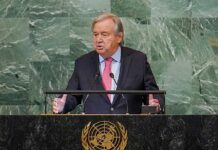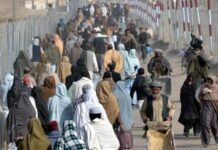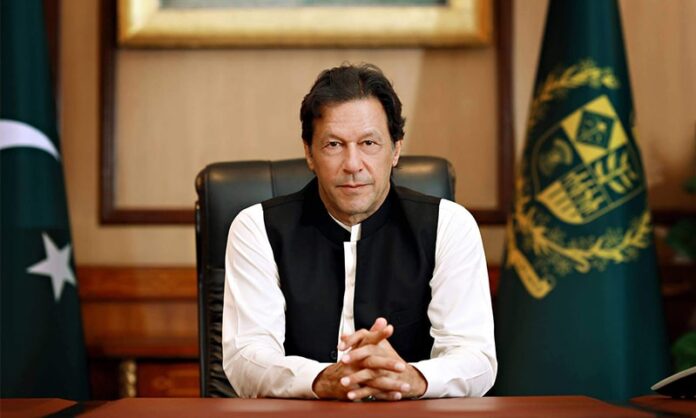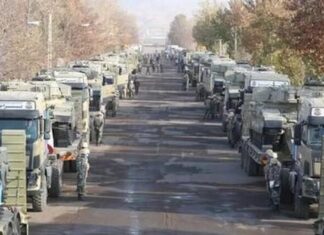Imran Khan was ousted as prime minister after a no-confidence motion in Pakistan’s parliament. But what led to his downfall?
When Imran Khan was elected Prime Minister in 2018, almost everything seemed to work out.
A national champion in cricket, he became a charismatic politician and, after years of struggle, succeeded in replacing two political rivalries that had dominated Pakistan for decades.
He emerged as a new force with passionate rallies full of catchy anthems that, along with his powerful presence on social media, reinforced his unshakable anti-corruption message. Mr Khan promised to “change” the country and build a “new Pakistan”.
No prime minister has ever completed a full five-year parliamentary term in Pakistan, and it looked like Imran Khan could be the first.
But as soon as he seemed to have a strong position, he could explain his downfall. Many acknowledge that he came to power with the help of Pakistan’s powerful military and intelligence services – and then clashed with them – but both sides deny it.
Undoubtedly, Mr. Khan enjoyed widespread and genuine public support in 2018.
But he also had the covert support of what is known in Pakistan as the “government” or the military. The military has directly or indirectly controlled the country for most of its life, and critics have called Imran Khan’s government a “hybrid regime.”
Support for Mr. Khan himself has been demonstrated in various ways. During the 2018 campaign, the distribution of media outlets that sympathetically reported on his opponents declined, and some candidates were either deceived or forced to join his party.
“He was their peddler. They were the ones who brought him to power,” Imran Khan’s party member told the BBC, referring to the army.
His main rival, Nawaz Sharif, was first disqualified and later convicted of corruption. Many suspected that Mr. Sharif had indeed been involved in corruption in the past – but the real reason for his punishment at the time was his differences with the military.
Mr. Sharif began his political career under the shadow of a military dictator, then became more independent and resented “sovereignty.” He has always denied involvement in corruption, claiming that the allegations are politically motivated.
On the other hand, after coming to power, Mr. Khan proudly declared that he and the military were “sympathetic” to political decisions.
The consequences of this situation have been a source of concern for civil society activists: they have faced a wave of attacks and kidnappings targeting journalists and commentators critical of Mr Khan’s government and the intelligence services. Both denied involvement, but no other culprits were identified.
Mr Khan has insisted that his focus is on improving the government, making significant improvements in the social welfare system and, for example, launching a health insurance scheme in large parts of the country.
In other respects, however, he has faltered. His decision to appoint an inexperienced and incompetent political newcomer to the key post of chief minister of Punjab, the country’s most populous state, has drawn widespread ridicule.
While no explanation was given as to why Mr. Khan did not remove his appointment, Osman Bazdar, despite strong criticism, there were rumors that the Prime Minister’s wife, a kind of spiritual guide, had warned him that Mr. Bazdar was happy. He is Yemen and – if he wants to oust him – his whole government will fall.
There were other challenges. The cost of living in Pakistan increased as food became more expensive and the rupee depreciated against the dollar.
Imran Khan’s supporters blame the global situation, but public anger against him has grown. Complaints of this kind have become very common: “The nobles may have filled their pockets, but at least they were doing the right thing.”
But for a while, the prime minister seemed to be the best option for the military. He set a world record, and his decision not to order a full quarantine during the Coronavirus epidemic resulted in less-than-expected casualties – though no one can yet pinpoint the exact reason.
Meanwhile, his opponents increasingly raised their voices against the army, naming the army commander, General Bajwa, and the head of the intelligence services, General Feyz Hamid, as responsible for “selecting” Imran Khan.
Last year, the situation changed dramatically. Some observers told the BBC that the military was increasingly frustrated by Mr Khan’s failure to provide good governance, especially in the Punjab, and perhaps by how openly blamed by the opposition for bringing him to power.
Most importantly, there was a rift between General Bajwa and General Feyz Hamid, who many saw as the next army chief.
General Hamid was apparently so confident in his future that he had even previously told officials in neighboring Afghanistan that he would be in charge of the next army.
However, a source close to the military said that although General Hamid was considered someone capable of effectively managing “dirty work” – that is, managing politicians or silencing critics – he was not seen as “the leader of this institution”.
Tensions between the two powerful figures came to the fore during a private engagement with influential commentators last summer. One of the journalists asked a question, but the head of the ISI told him it was time.
General Bajwa intervened quickly, saying, “I am the boss, and I will decide when our work is over,” and then he heard the question and answered it.
In October, disputes escalated and gripped Imran Khan. It turned out that General Bajwa wanted a new person in charge of the intelligence services, and the army announced a change of position.
However, Mr. Khan, who had a close relationship with General Faiz Hamid, resisted and apparently asked him to remain in office until the election – assuming that General Hamid could once again guarantee Mr. Khan victory. help.
For almost three weeks, the prime minister refused to issue an official announcement confirming the change of position and eventually surrendered. The apparent rift between the army and Imran Khan’s government made the opposition bolder.
A number of sources told the BBC that when they began a no-confidence motion, seeking the views of potential separatists from within the party and its coalition allies, the military explicitly stated that it would be “neutral” in the matter.
Mr Khan, a dissident member of Mr Khan’s party, told the BBC that he and other members of parliament had been “contacted” by the intelligence services to tell them what to do.
“We used to be physically treated,” he said angrily. But when General Faiz Hamid left the office, the “calls” stopped. “The army is not interfering now,” he added.
Journalist Kamran Youssef told the BBC that the army had played a role in “managing” Imran Khan’s allies and a small majority in government. “Once that support was gone, his downfall was inevitable,” he said.
There were further differences between Mr. Khan and the military, especially in foreign policy. Although defending his visit to Moscow on the day Russian troops arrived in Ukraine and rejecting Western officials’ efforts to condemn Russian President Vladimir Putin’s behavior, General Bejova said last week that the invasion “must stop immediately.”
Mr Yusuf said Imran Khan had previously thwarted General Bajwa’s efforts to revive part of his trade with regional rival India “because of political costs”. Ironically, previous civilian relations with the Pakistani military had soured because they wanted to improve relations with India – but at the time, the military did not.
However, Mr. Khan has repeatedly stated that he will not give up the fight. He claims that because of his anti-Western leanings in foreign policy, which include criticism of the US war in Afghanistan, he is the victim of a US-led attempt to key in “regime change” in Pakistan.
Most analysts see this as a deliberate exaggeration of the diplomatic report sent by the Pakistani ambassador to Washington.
However, this is a narrative that seems to be in line with Mr. Khan’s supporters and exploits the repository of anti-American sentiment in the country.
Ironically, the Pakistani military itself has created a favorable atmosphere for conspiracy theories by repeatedly warning of the vague dangers of “foreign conspiracies” or “foreign plans.”
Mr Khan once told his cricket team to “fight like tigers in a corner” and that he was determined to be a tough opposition figure.

























































